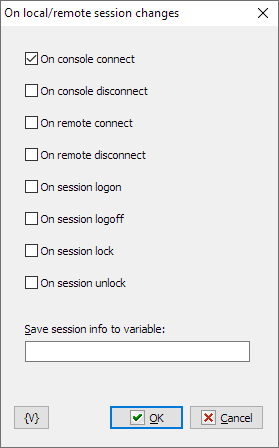This trigger responds to opening and closing a user session on your PC. The trigger responds to any other session, no matter in what session RoboTask is running. This can be useful when working on Terminal Server.
When a trigger responds and starts the task, it can write to a task variable information about the session in JSON format, with fields:
•event - which event occurred. Possible options:
CONSOLE_CONNECT
CONSOLE_DISCONNECT
REMOTE_CONNECT
REMOTE_DISCONNECT
SESSION_LOGON
SESSION_LOGOFF
SESSION_LOCK
SESSION_UNLOCK
•client_name - the client computer name. For local sessions, this field is always empty
•client_address - the client network address. For local sessions, this address is always 0.0.0.0
•domain - the domain name of the client computer. For local sessions, this field is always empty
•user_name - The client user name. For local sessions, this field is always empty.
•hres - horizontal dimension, in pixels, of the client's display
•vres - vertical dimension, in pixels, of the client's display
•color_depth - color depth of the client's display.

Trigger mode
Enable one or more events for the trigger to respond:
•Console connect
•Console disconnect
•Remote connect
•Remote disconnect
•Session logon
•Session logoff
•Session lock
•Session unlock
Save session info to variable
Enter the variable name to save the session information. The action saves session information as JSON value with fields:
•event
•client_name
•client_address
•domain
•user_name
•hres
•vres
•color_depth
![]() Related Topics
Related Topics
WebSocket Server On HTTP Request